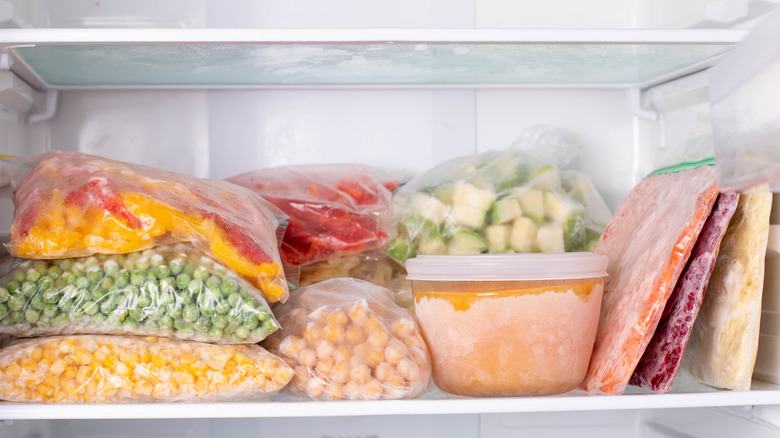Why Frozen Foods Are Better For You Than You Think, According To Bobby Flay
While many of us are hard-wired to give the freezer section a hard pass and go for fresh fruits and vegetables instead, there are also some underrated frozen foods you should consider buying. In fact, many chefs including Bobby Flay also believe that some frozen foods get a bad rap. In a recent episode of "Always Hungry," Flay gives his daughter Sophie a few tips on how to store certain foods so that she's never caught off guard.
The celebrity chef says he put his freezer to good use when the coronavirus pandemic first struck, because he didn't know what was just around the corner. Flay then went on to dispel the myth that all frozen foods are not good. "The bottom line is that it's not true. It's not a blanket statement," the TV personality said. He then pointed out that a number of fresh foods like seafood used to make sushi and sashimi are flash frozen almost as soon as they are caught, as are some vegetables like peas, which are frozen at the peak of ripeness. In some instances, Flay points out, frozen food even tastes better than fresh.
Why freezing is good for produce
Many nutrition experts are on board with Flay's statements about the quality of frozen food. Researcher Ronald Pegg tells Tufts University's Health & Nutrition Letter that, "Freezing in essence is nature's pause button. It maintains freshness, slows down enzymatic reactions, increases the time it takes anything to degrade." Unfortunately, as Pegg points out, fresh produce doesn't fare as well because it is "a living material...It degrades over time and loses nutrients. That's normal and to be expected."
The statements weren't made in a vacuum, as researchers bought and tested both fresh and frozen fruits and vegetables at local supermarkets. While both had similar nutritional compositions from the get-go, fresh produce was found to lose vitamins A and C, as well as folate, after it had been sitting in the fridge for five days. However, Very Wellfit points out that the freezing process has no impact on calorie counts, fiber, or mineral contents of a food item.
But also, as Flay points out, not all frozen food is good for you. A number of products can be full of saturated fats, sugars, and salts. So it's very important to read the product's nutrition label to make sure you're making smart frozen food choices for your diet. As director of Tufts' HNRCA Cardiovascular Nutrition Laboratory Alice H. Lichtenstein points out, "It is like anything else in the supermarket aisles — one needs to pick and choose carefully. Doing so can yield big benefits."

